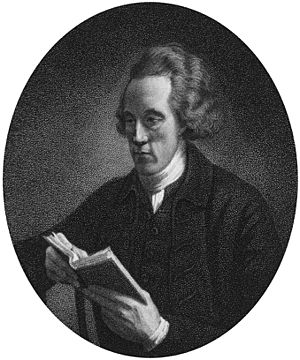Joseph Townsend facts for kids
Joseph Townsend (born April 4, 1739 – died November 9, 1816) was a British doctor, geologist, and a church leader (vicar) in a town called Pewsey in Wiltshire. He is perhaps best known for his book from 1786, A Dissertation on the Poor Laws. In this book, he shared his ideas about how the economy works naturally. He believed that the government should not provide help for people who were struggling.
Townsend's ideas were similar to those of Thomas Malthus. Malthus later wrote about why public welfare (government help) might not be good. However, Townsend also suggested a system where people would pay into a group, like a club. These groups, called friendly societies, would then help members with health costs or funeral expenses.
Contents
Joseph Townsend's Early Life and Career
Joseph Townsend was the fourth son of Chauncy Townsend. His father was a successful merchant in London and also a Member of Parliament. Joseph went to Clare College, Cambridge, and finished his studies in 1762.
In 1763, Townsend became a priest in the Church of England. He then studied medicine in Edinburgh. He remained a dedicated Anglican throughout his life. He served as the Rector (main priest) of Pewsey from 1764 until he passed away.
Townsend was connected with certain religious groups. These included the Countess of Huntingdon's Connexion and the Calvinistic Methodists. He even helped set up a chapel in Dublin in 1767–68. It is said that he allowed Methodists to preach in his church in the 1780s. From 1769, he was also a personal chaplain to the Duke of Atholl. He traveled with the Duke on a long trip across Europe.
Joseph Townsend's Geological Discoveries
Joseph Townsend was also very interested in geology, the study of Earth's rocks and layers. He was friends with William Smith, who was a pioneer in mapping geological layers. In June 1799, Smith explained his theory of stratigraphy (the study of rock layers) to Townsend. This happened over lunch at Townsend's house in Bath.
Townsend understood and accepted Smith's ideas about rock layers. He even published some of Smith's work in his own book. This book was called "The Character of Moses as an Historian, Recording Events from the Creation to the Deluge". Townsend was among those who realized that the many layers Smith found meant Earth was incredibly old. He did not agree with James Hutton's idea that Earth's processes have always been the same. Townsend believed the Bible's creation story could still fit with the idea of an ancient Earth.
Joseph Townsend's Views on Society
In his book A Dissertation on the Poor Laws, Townsend shared strong opinions. He believed that giving relief (help) to the poor allowed the population to grow too much. He thought it protected those who were weak. He used a story about goats and dogs on an island to explain his point.
Townsend argued that all government help for the poor should be stopped. He believed this would make people work harder. He famously said that "it is only hunger which can spur and goad them on to labour." He also stated that hunger is a "peaceable, silent, unremitted pressure." He thought hunger was the most natural way to make people work hard. He believed it could even "tame the fiercest animals" and teach "decency and civility."
Joseph Townsend's Published Works
- A Dissertation on the Poor Laws, 1786
- A Journey Through Spain in the Years 1786 and 1787, 1791
- "Townsend Guide to Health Being Cautions and Directions in the Treatment of Diseases", 1795
See also
 In Spanish: Joseph Townsend para niños
In Spanish: Joseph Townsend para niños
 | Emma Amos |
 | Edward Mitchell Bannister |
 | Larry D. Alexander |
 | Ernie Barnes |


